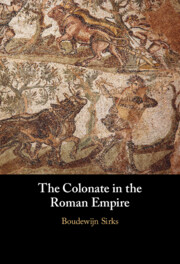Book contents
- The Colonate in the Roman Empire
- The Colonate in the Roman Empire
- Copyright page
- Contents
- Introduction
- Chapter 1 The Colonate in the East under Justinian, 527/534–565/642
- Chapter 2 The Colonate in the Year 438 in Theodosius’ Code
- Chapter 3 The Colonate in the East, 438–527
- Chapter 4 The Colonate in the West, 438–ca. 506
- Chapter 5 The Colonate between Theodosius’ Code and Diocletian and the Third Century, 438–293/268/249
- Bibliography
- Index Locorum
- General Index
Chapter 1 - The Colonate in the East under Justinian, 527/534–565/642
Published online by Cambridge University Press: 04 January 2024
- The Colonate in the Roman Empire
- The Colonate in the Roman Empire
- Copyright page
- Contents
- Introduction
- Chapter 1 The Colonate in the East under Justinian, 527/534–565/642
- Chapter 2 The Colonate in the Year 438 in Theodosius’ Code
- Chapter 3 The Colonate in the East, 438–527
- Chapter 4 The Colonate in the West, 438–ca. 506
- Chapter 5 The Colonate between Theodosius’ Code and Diocletian and the Third Century, 438–293/268/249
- Bibliography
- Index Locorum
- General Index
Summary
The subjected status of the coloni equalled them to persons alieni iuris, as slaves were too, but they were still free. It made marriages with those not in this way subjected with regard to the transmission of status ‘unequal’. It implies that children follow the status of the mother. This ‘unequal marriage’ and its consequence was introduced by earlier laws. To prevent the children out of marriages of a colonus with a not subjected woman being not subjected, the senatusconsultum Claudianum was applied. That made children follow the status of the father. The abolition of the senatusconsultum led Justinian to introduce the faculty of estate owners to recall coloni from such marriages in order to prevent the loss of labour force. CJ 11.48.19 established that every colonus after thirty years of service was no longer alieni iuris and thus subjected to their estate owner, but free from his control over him and his property. Such coloni are called ‘free’ coloni (coloni liberi). They remained tied to the estate and had to render services and to pay poll tax, but could now fulfill public functions as no longer being of subjected status.
Keywords
- Type
- Chapter
- Information
- The Colonate in the Roman Empire , pp. 30 - 146Publisher: Cambridge University PressPrint publication year: 2024

